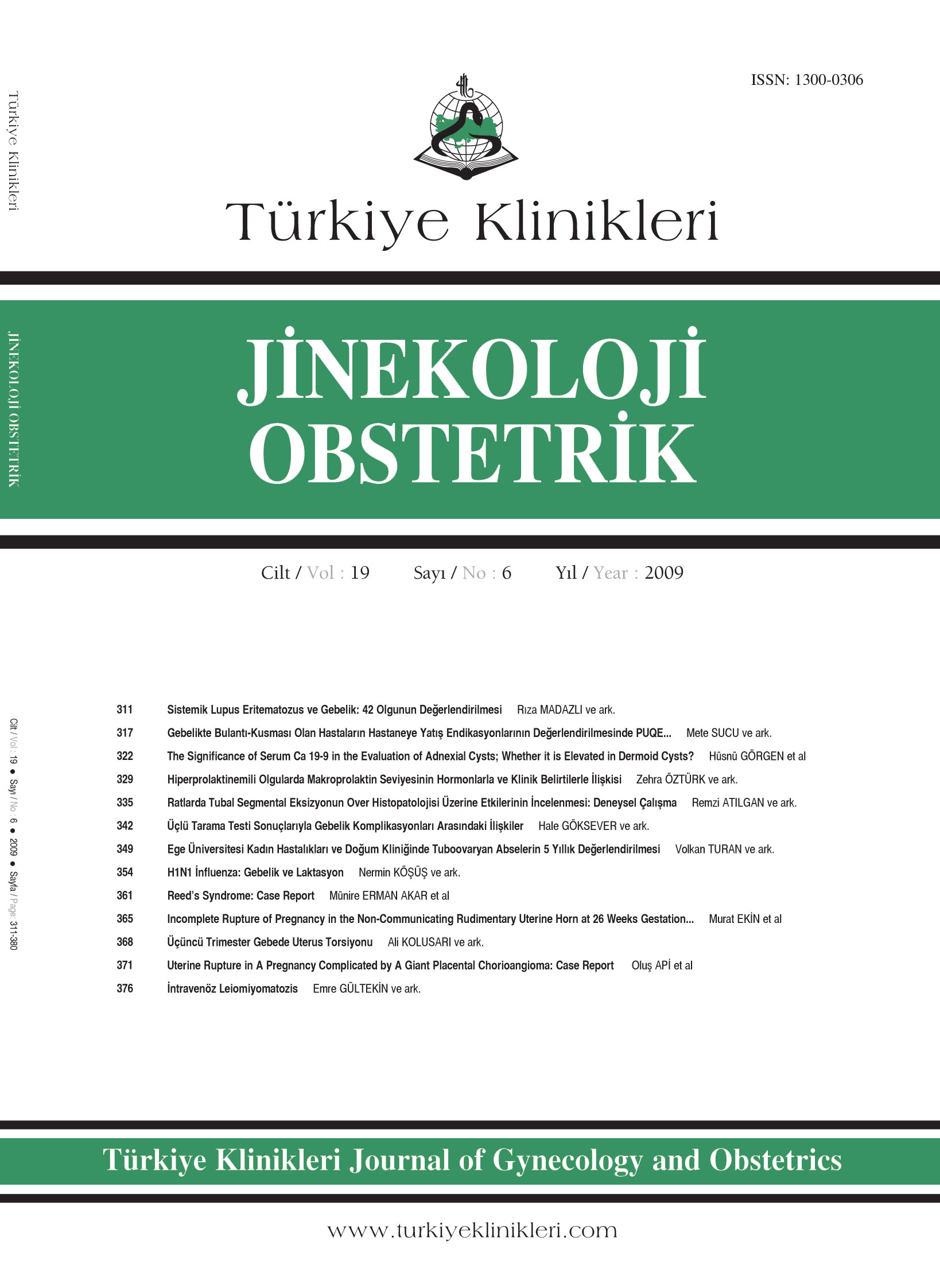Open Access
Peer Reviewed
CASE REPORTS
3299 Viewed1538 Downloaded
Uterine Torsion in Third Trimester Pregnancy: Two Case Reports
Üçüncü Trimester Gebede Uterus Torsiyonu
Turkiye Klinikleri J Gynecol Obst. 2009;19(6):368-70
Article Language: TR
Copyright Ⓒ 2025 by Türkiye Klinikleri. This is an open access article under the CC BY-NC-ND license (http://creativecommons.org/licenses/by-nc-nd/4.0/)
ÖZET
Gebelikte 45 derecenin üzerinde uterus torsiyonu oldukça nadir görülen ve klinik tanısı zor olan bir komplikasyondur. Maternal prognoz genellikle iyidir. Ancak perinatal mortalitesi yüksektir. Bu çalışmada, obstetrik pratiğimizdeki uterus torsiyonlu iki olgu rapor edilmiştir. İlk olgumuz eylemde miad gebelik ve transvers duruş nedeni ile, ikinci olgumuz ise ilerlemeyen eylem tanısıyla sezaryene alındı. Yapılan eksplorasyonda iki olguda uterusun 180 derece sağa rotasyonu tespit edildi ve bebekler uterus posterior alt segment transvers insizyon ile doğurtuldu. Ameliyat sırasında ve sonrasında herhangi bir komplikasyon izlenmedi. Sonuç olarak uterus torsiyonu nadir görülen bir durumdur. Semptomlarının nonspesifik olması nedeni ile tanısı güçtür. Özellikle fetal prezantasyon anomalisi bulunan ve ilerlemeyen eylemi olan olgularda uterus torsiyonu akılda bulundurulmalıdır.
Gebelikte 45 derecenin üzerinde uterus torsiyonu oldukça nadir görülen ve klinik tanısı zor olan bir komplikasyondur. Maternal prognoz genellikle iyidir. Ancak perinatal mortalitesi yüksektir. Bu çalışmada, obstetrik pratiğimizdeki uterus torsiyonlu iki olgu rapor edilmiştir. İlk olgumuz eylemde miad gebelik ve transvers duruş nedeni ile, ikinci olgumuz ise ilerlemeyen eylem tanısıyla sezaryene alındı. Yapılan eksplorasyonda iki olguda uterusun 180 derece sağa rotasyonu tespit edildi ve bebekler uterus posterior alt segment transvers insizyon ile doğurtuldu. Ameliyat sırasında ve sonrasında herhangi bir komplikasyon izlenmedi. Sonuç olarak uterus torsiyonu nadir görülen bir durumdur. Semptomlarının nonspesifik olması nedeni ile tanısı güçtür. Özellikle fetal prezantasyon anomalisi bulunan ve ilerlemeyen eylemi olan olgularda uterus torsiyonu akılda bulundurulmalıdır.
ABSTRACT
Uterine torsion of more than 45 degrees in pregnancy is an uncommon but potentially life threatening condition. Maternal prognosis is favorable but perinatal mortality is increased. We reported two cases of uterine torsion from our obstetrical practice. The first case was a term pregnant in labor with abnormal (transverse) fetal presentation and the second case with abnormal labor progress. Both cases underwent caesarean section. Upon exploration, a dextrorotation of 180 degrees in both cases was detected and birth was performed with transverse incision in the posterior lower segment. No complication was observed. In conclusion, the non-specific clinical course and rarity of this condition makes the preoperative diagnosis difficult but obstetricians should have this complication in mind when performing a caesarean section on a woman with abnormal presentation of the fetus or in case of a failure in labor.
Uterine torsion of more than 45 degrees in pregnancy is an uncommon but potentially life threatening condition. Maternal prognosis is favorable but perinatal mortality is increased. We reported two cases of uterine torsion from our obstetrical practice. The first case was a term pregnant in labor with abnormal (transverse) fetal presentation and the second case with abnormal labor progress. Both cases underwent caesarean section. Upon exploration, a dextrorotation of 180 degrees in both cases was detected and birth was performed with transverse incision in the posterior lower segment. No complication was observed. In conclusion, the non-specific clinical course and rarity of this condition makes the preoperative diagnosis difficult but obstetricians should have this complication in mind when performing a caesarean section on a woman with abnormal presentation of the fetus or in case of a failure in labor.
MENU
POPULAR ARTICLES
MOST DOWNLOADED ARTICLES





This journal is licensed under a Creative Commons Attribution-NonCommercial-NoDerivatives 4.0 International License.










